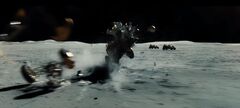I brushed "Interstellar Exploration" twice in 24 hours. It is really a good time and place. When I fell into doubts about my own existence and confused about the mystery of the universe, I encountered "Interstellar Exploration" brought by James Gray. Since 2013, every year the film industry has encountered a science fiction film that can be recorded in history, and this one is the best representative of this year. This film is completely the opposite of the commercial peak "Interstellar" five years ago. Whether it is from the subjective tendency of the director or the actual effect of the film, it is destined to be an author's film that only a few people can understand. The film’s outlook for the future of space exploration is also very different from other sci-fi masterpieces. There is no space fold-over technology, no dormant technology. The lack of these elements makes the film possess a kind of transmission of loneliness beyond the same genre. This sense of loneliness is different from the loneliness in human society that people understand in a broad sense. On the contrary, it is a gradual distortion of self-meaning understanding that is completely separated from the real world and brought about by the deep and terrifying universe. The universe is huge and the solar system is very small, but even going to the edge of the planetary belt of this galaxy, the long time and the empty scenery are a great devastation to the heart of every brave explorer. The father played by Tommy Lee Jones became the only surviving member of the pioneer exploration team. His strong spiritual perseverance comes from his loss of understanding of the world and his obsession with the mysteries of the universe. The son played by Brad Pitt, although he ended up completely different from his father, also repeats almost all the mental journey his father has experienced. Many people think that Pete has been living in the shadow of his father in the film, and finally completed the killing of his father and got a new life, but in fact the two are just the same. Father’s obsession has long been unshakable, just like the persistent idealist explorer in the director’s predecessor "Lost Z City", only this time, the main perspective has been switched to the role of the son, but the same thing between the two movies is that the father The values with his son are still one, and Lee Jones's final self-exile, accompanied by the only loud shout in Pitt's entire movie, represents the common "death" of the two. The father has already died for his son once, so that the son can truly come out of despair and nothingness, embrace his unique little emotional retention of the worldly life, and return to his homeland. The film selects three unique planets in the solar system, and uses three different theme colors to express the three different emotions of the protagonist. The gray of the moon symbolizes the confusion when the target is unknown, and the red of Mars reflects the anger and anxiety in the protagonist's heart. And what grabs my soul most is the final blue of Neptune. The director will have the ultimate goal Putting the ground here is really a genius. Neptune is the edge of the known planetary belt and is the first stop for mankind to leave the solar system. However, this has become an unbreakable barrier and the edge of the collapse of mankind's rationality. The deep blue-black of Neptune brings people a cold suffocation, loneliness and despair. The protagonist travels all the way from the earth to this point, like an exile towards loneliness, every step outside, he gets closer to the eternal despair. In the end, father and son meet in such a place, and all the results are not surprising. This is the fork in the road of consciousness. You either fall into eternal nothingness or look back at the short-lived light. "Interstellar Exploration" is not an optimistic human hymn. It has a large background but a very small pattern. The whole film is almost a one-man show by Brad Pitt. As a stream of consciousness film focusing on personal mental journey, it will shock people who understand it, and it will also make people who are not in this system sleepy and unbearable. It presents a neutral concept of human exploration of the interstellar, just like Pete's inner monologue: There are so many beautiful planets, and there is no sign of life under the magnificent exterior. The universe is really too big, and people are eager to explore all the possibilities that science cannot prove, but often they can only see their own faces in the dark. Maybe it's just that we haven't gone far enough, but the current achievements and progress have little effect on the expansion of our cognitive dimension. What we can do is to get DHL and Subway to go to the moon, and at the same time bring disputes over resource grabbing. We are imprisoned by the universe in this small galaxy, and our dependence on our homeland and social emotions makes us unable to sustain a journey in the cosmic dimension that is like a step in place. When they realize that the outside world is nothing but nothingness, people still choose to return to reality after suffering and entanglement. After all, nothingness is the only thing that exists forever, and the fleeting colorfulness is the thing that should be cherished most in this life. 8.8 minutes
View more about Ad Astra reviews











